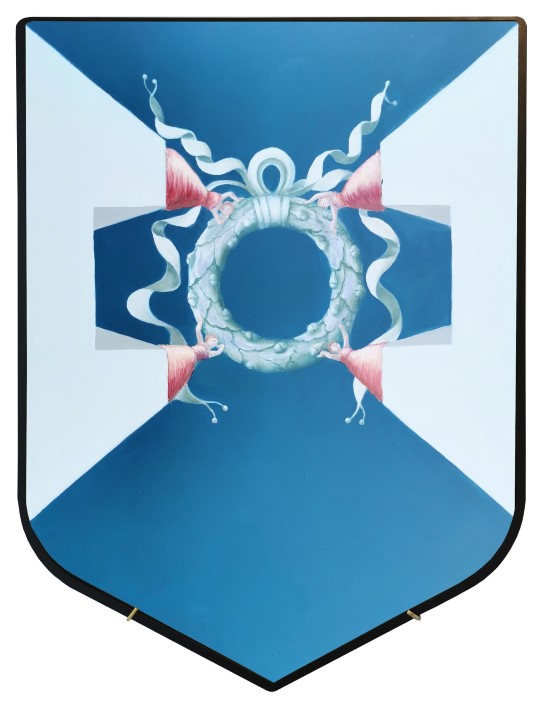Discussion about Den Norske Idealstaten with Max and Aseel

Transcription
Programme manager:
The collection of artworks you see here are about Den Norske Idealstaten, or The Ideal Norwegian State, and how we can have the best possible future. Here you can see a small corridor where there are heraldic shields decorated with symbols. These symbols represent good and important things from different places in Norway.
The artist group Alt Går Bra has travelled around Norway asking people questions. What would our ideal state look like? What kind of society do you dream of? There was only one rule: complaining was not allowed.
To talk a bit about the kinds of ideas that young people today have about these things, we’ve invited Max and Aseel to talk to us here at the National Museum. They are both twenty-one years old and have contributed to this exhibition.
Welcome! If we take you first, Aseel: how would Norway function if everything were going as well as it possibly could?
Aseel:
In an ideal state, the state would make up for all the kinds of factors that can be disadvantages in your life. For example, that your parents can’t help you with your homework, or that your parents can’t afford to send you to out-of-school activities, or that you can’t afford to go on holiday with your friends. All the kinds of things that hold you back from being able to realize your potential, to be what you want, and to be able to do exactly what you want in life. You would get almost a kind of compensation for these things, because they aren’t things you chose for yourself.
Programme manager:
Mmm… Is this something you’ve thought about, Max?
Max:
Yes, I have. I think that a society where everyone has an equal chance to succeed would be a very good thing. It’s not necessarily so important for me that everyone ends up with the same things, or that everyone is completely equal. But I do think that we should all have the same starting point to become successful, independent of family or where you come from and so on. I think that would be a good society to live in.
Programme manager:
It sounds great, but how do you start to achieve it?
Aseel:
I think you start from scratch. I’m thinking about child poverty. That you combat it, because in a way, it does so much to set the stage for what happens later on.
Max:
And I also think that the education system is an important place to start, because we should have good teachers – and also enough teachers – so that it doesn’t matter so much what skills your parents have, or don’t have.
Programme manager:
Yeah.. What do you think about this ideal in relation to primary and lower-secondary school, Aseel? Have we got a long way to go, do you think, here in Norway?
Aseel:
For me it’s almost been the opposite, that school has been so good that I think it’s compensated for other things. For example, I’m from an immigrant background, so when we first came to Norway, my parents had to learn Norwegian and we were a bit disadvantaged financially and socially. So school kind of helped compensate for this, and it also gave me the foundation I needed to get up to the same level as all the others.
Programme manager:
Mmm.. It’s important, and fantastic that perhaps we’ve already gone quite a long way along this road. But what if we think a bit about the later years at school? You’re now both well underway with your studies at the University of Oslo, but what would the route to higher education look like in an ideal state then?
Max:
I envisage, for example, that grades in some subjects could carry more weight for getting into particular courses, because those subjects might be about things that are going to be more useful. And I also think that more consideration could be given to students’ overall progress at school. Things like what you’re learning, whether you’ve become more mature in that period. Not just how well you’ve done in a kind of standardized final exam, for example.
Aseel:
I think it would also be very good if people started to look at motivation. And at what kinds of qualities people have. I mean, grades aren’t everything, are they?
Programme manager:
Mmm.. Right, Aseel and Max, thank you very much for sharing your thoughts about an ideal Norwegian state. But before we finish up, there’s one important thing that we haven’t talked about, and that I know is very important to both of you.
Max:
Yes. At least for me, my perfect Norway would be a more sustainable state. A place with more climate-friendly solutions that are both easier to adopt and more accessible. That’s a change I hope to see in the future. Both because I feel that it’s something that has to happen, and because I think that it would really improve the quality of life for everyone, and particularly for us young people who are going to be affected very badly by climate change if we don’t take action now.
Aseel:
I very much agree. I hope that people begin to get to grips with this very quickly. Because it’s our generation and the generations after us that are going to really feel the consequences. And thinking just very generally, I think the future is very unpredictable. So there is something important about the path we choose to follow.